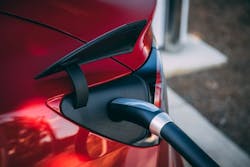From major legislative moves paving the way for a growing electric vehicle infrastructure to the full slate automakers like Ford, Jaguar Land Rover, Bentley, and General Motors that have formally committed to a fully electric model, 2021 is shaping up to be a pivotal year for EVs.
Key EV announcements and updates seem to be coming at full tilt with little sign of slowing down, leaving the aftermarket industry bracing for an emissions-free future. But what exactly should auto repair shops be doing to prepare for the shift and how soon might shop owners expect to feel the tectonic shift?
As the industry continues to trend high-tech, Ratchet+Wrench checked in with Lester Kovacs, a 20-plus year industry veteran and the director of ideation for Dorman Products, shares his insight.
From a glance, how well-prepared is the repair industry for an electric future?
In my experience the general sentiment toward alternative engines has been 50-50. There are plenty of shops out there embracing change, but there’s a decent-sized pocket that seems determined to ignore it. A lot of those shops have been putting off the investments to learn those vehicles or they haven’t seen their business change dramatically yet and are focusing on the present, rather than the bigger picture.
There will come a day in each market where shops need to adapt or lose that business. Maybe the owner is planning to retire soon and OK passing those opportunities to the shop up the street, but at some point owners will have to make a conscious decision on whether they’ll invest and adapt or not.
Should there be a sense of urgency to prepare? What kind of timeline are most owners looking at?
That timeline is going to vary for each shop, some will need to move sooner than others based on location and how much and how quickly EVs have been adopted in their market.
If you look at places like California, an unprecedented amount of Teslas were sold over the last year, but the overall EV population there is still relatively low compared to internal combustion engines (ICEs). There will still be plenty of ICE vehicles on the road for years, so most shops should have time to invest in hybrids and EV repair, but really you want to investigate your market’s car parc.
Are there any fleets in your area? Has a major business in the area switched their fleet to EVs? Are you seeing Priuses everywhere? If so, your sense of urgency should be high. Those are opportunities you don’t want to lose. If you’re in a more rural area where there hasn’t been much adoption yet, you can take more time to slowly wade in with something like an inexpensive webinar to get more familiar alternative engine systems.
You won’t know how urgently to act until you take the temperature in your market and see if there’s a player that could be moving the needle. If there are shops in your area that are seeing success servicing those vehicles, it’s time to make an investment.
Is there a clock ticking for some shops? Could it be too late for some to catch up as EVs become more popular?
For most shops that have been investing in new technology over the years, this won’t be a big issue. The real investment for shops when it comes to EVs is time and training and for most shops that’s going to be affordable.
The ticking clock is going to be for the large number of shops out there (and they’re out there) that still haven’t invested in scan tools and are still relying on 90 percent mechanical repair.
The systems behind features like driver assist and blind spot detection are just as complex as the new EV and hybrid systems we’re seeing. If you don’t make the investments in the right technology and training soon, it will be a huge chase to catch up. It sounds obvious, but there are shops that have been avoiding this for the last 20 years and at this point all is not lost, but those shops will need to make huge investments in tools and equipment. I’d almost advise hiring a consultant in those scenarios because it would be such a large undertaking.
How can shops begin to prepare for this shift?
That’s going to vary depending on the size of the shop. For larger shops or chains like a Meinecke, it’s going to take years of investment to get everyone trained across the board. But if you’re a two-person to 10-person shop, you could potentially be up and running on EV repairs in a little less than a year with some pretty intense training. If you have an A-tech on your team that’s sharp and understands regular vehicle systems and takes the proper classes, they could be pretty efficient within a year to 18 months on all of the different systems and how to work on them.
The good news is for the shop owners that are willing, aggressive, and want to grow, all of the tools are out there and if you’ve been investing in technology over the years, the real barrier to entry will just be training.
Especially since COVID, the training is not only out there and available but much more of it can be accessed online. Dorman hosts trainings but people like Craig Van Batenburg with the Automotive Career Development Center are doing a fantastic job at training nationwide, but also globally.
Sure, you’ll likely need to invest in things like gloves and training manuals, but in a time where shop owners are also looking at investments in things like ADAS, training and resources to learn more about and prepare for EVs is going to be doable for most shops. You just have to be willing to invest the time.
About the Author

Megan Gosch
Megan Gosch is the associate editor of Ratchet+Wrench, where she produces content and oversees production of the publication.
